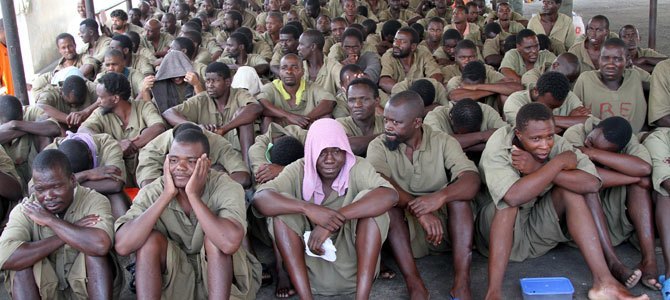
A CONVICTED armed robber and murderer has recounted the horrors of being on death row for 15 years.
by VENERANDA LANGA
Cuthbert Tapuwanashe Chawira (45) is currently on death row at Chikurubi Maximum Security Prison and has appealed to the Constitutional Court to reverse his and 14 other prisoners’ death sentences.
Chawira was sentenced to death in September 2000 after he was convicted of armed robbery and murdering a Fairmile Motel manager in Gweru.
He and 14 other inmates condemned to die have now been on death row for periods ranging between two and 18 years.
According to an affidavit exclusively given to The Standard, the inmates said the lengthy incarceration on death row had resulted in permanent stress, constant fear, physical, psychological and emotional harm.
“Because of the torture we have been subjected to while waiting for a long time on death row, it will be unconstitutional to execute us and, therefore, our sentence should now be committed to that of life imprisonment,” Chawira said in his affidavit.
Chawira and another death row inmate Emmanuel Dolosi (46) revealed that condemned prisoners still lived in fear of execution on a daily basis although most of them had converted to Christianity. Chawira said sometimes cruel prison guards played death row prisoners up, threatening them with immediate execution.
- Chamisa under fire over US$120K donation
- Mavhunga puts DeMbare into Chibuku quarterfinals
- Pension funds bet on Cabora Bassa oilfields
- Councils defy govt fire tender directive
Keep Reading
“The challenge with execution is that none of the prisoners have any idea who the next one will be. Thus during the night, which is the period where those to be executed are taken away, we hardly sleep,” Chawira revealed.
“In addition, if we see any unusual behaviour on the part of prison guards, we freeze and enter into psychological trauma. After an execution, we go for days without eating or feeling anything or being able to sleep.”
He said the trauma of knowing that one could be the next person to be executed, as well as being locked up several hours in solitary confinement, resulted in some death row inmates getting mentally disturbed. “At Harare Central Prison, executions were carried out during my time there,” Chawira said.
“These were of prisoners Zuda Chimuchenga, Joshua Nyamazana from Gokwe, Antony Muuzhe, [Stephen] Chidhumo, [Edgar] Masendeke, Elias Chauke, and a prisoner known as Bigboy. The last execution I recall took place in 2005 and involved Mandhla Masina. I knew all these prisoners personally. We had stayed together for many years.”
He said the loneliness and deadening of feelings for oneself and others resulted in mental and physical depression.
“The frequency of prison deaths of our comrades really affects us and compounds the degraded mental condition that we suffer from. The conditions in our prisons are tough and they have a serious effect on prisoners’ health,” Chawira said.
“The mortality rate of prisoners is very high. Tens of prisoners are dying every year. I was tried with four other accused persons, but they are all late now.”
Chawira described Chikurubi’s food as horrible and consisting largely of sadza and vegetables, sometimes with beans, or even sadza with boiled water mixed with soup.
Solitary confinement for death row prisoners was said to be for 23 hours per day with only 30 minutes of exercise per session in the morning and afternoon.
“Further, at Harare Central Prison, there are no toilets in the little cells and we have to use the ‘gamashura’ container [a 20-litre plastic container]. It is this container that has to carry our waste and everyday, we have the embarrassment of carrying it two stairs down to the public toilets in the ground floor,” he said.
“There are no newspapers or tissues in these toilets and sometimes, prisoners resort to using the Bible as toilet roll.” Chawira said the worst days in prison were weekends where there were no prisoners going to court, resulting in them being locked up at 3pm in the afternoon.
“On weekends, you are subjected to bodily searches. All of us are called up on a Sunday morning and are made to crouch in a courtyard. Therein after, you are asked to totally undress and then walk back to your cell naked in front of everyone else. This is degrading,” he said.
Chawira said “D Class” prisoners like himself were kept in a tiny cell which he shared with five other inmates.
He said the prisoners could hardly move and breathe as the area space was 1,5 by three metres.
He said treatment of death row prisoners was in contravention of the Prisons Act Section 106 which made it clear that every prisoner sentenced to death should be confined in a safe place.
The act says if possible, the inmates should be kept apart from other prisoners and placed under constant observation.
He said the effects of being a death row prisoner were a sense of helplessness and defeat, hopelessness and mental fatigue, emotional emptiness and a decline in mental and physical health.
“Society has written us off and no one considers us as human beings. We are not normal people and the only thing that has kept us going is the fact that we have all converted to Christianity and survive by praying and the faith that our Lord will save us,” Chawira said.
“We committed crimes virtually at the spur of the moment. Under ordinary circumstances, we would, therefore, deserve a second chance. No one in this world must be put on death row. Capital punishment must be abolished. It is backward and antiquated and has no relation to the human rights enshrined in our Bill of Rights.”
At the time he was incarcerated, he had a wife and a four-year-old child, who would be 19 years old today.











